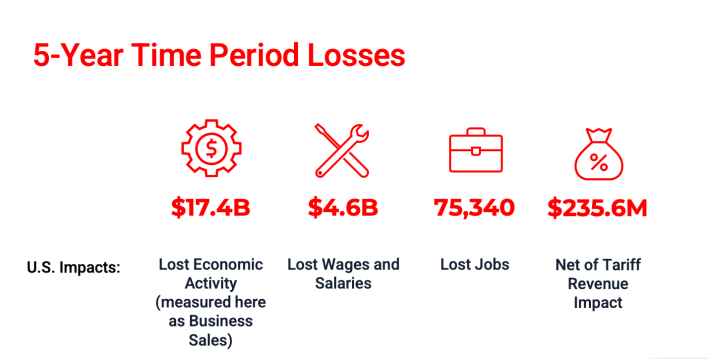Chaos over Trump's tariffs — aka the global trade war — would be disastrous for shared and active transportation priorities, even if skyrocketing car prices do discourage some Americans from picking up that new Ford F-150, advocates say.
Global markets cheered the news on Wednesday that President Trump had backed off some of his most disruptive economic policies, postponing reciprocal tariffs on most countries for the next 90 days. That delay, though, did not include China, on which the administration still plans to raise tariffs a whopping 125 percent — and it did not stop transportation reform advocates from wondering what news of any further economic shocks might mean for how Americans get around.
While the news cycle has been saturated with warnings that car dealers would be among the hardest hit by Trump's policies as the price of imported auto parts explodes, Yonah Freemark of the Urban Institute warns that steep reductions in the auto market wouldn't necessarily mean steep reductions in driving – because many Americans don't have any other way to get around.
"Obviously, if automobile prices go up substantially, we're going to see a decline in purchasing," he said. "I don't think, though, that a decline in purchasing is going to be associated with less automobile dependence."
Instead, Freemark suspects U.S. motorists would simply delay replacing their automobiles, dragging down the average age of the fleet and slowing the uptake of the latest safety and emissions features. That might also mean slowing America's epidemic of car bloat as manufacturers roll out ever-bigger monster trucks, but Freemark suspects that silver lining won't outshine the downsides of keeping drivers stuck in older, dirtier cars without technologies like automatic emergency braking.
Many public transit vehicles, by contrast, are already subject to strict Buy America requirements, as are the construction materials used to build the infrastructure they rely on to keep buses and trains running. Those requirements, though, often still allow agencies to use imported parts, which could blow up already-strained budgets and get badly-needed projects delayed or cancelled.
More important, though, high tariffs would cut into overall tax revenues and strain government budgets in general — and when budgets are strained, transit tends to be among the first cuts.
"[Tariffs] could have a major effect on the economy, which in turn could have a devastating impact on the ability to fund the transportation system," Freemark added. "We saw that happen in the Great Recession, where there was an extreme economic slowdown that was associated with very large declines in tax revenues at the state and local levels. Then those governments essentially had to dramatically cut the provision of services — including in transportation."

The intercity bus industry, meanwhile, is heavily reliant on foreign manufacturers to replace many of its vehicles, so much so that the American Bus Association estimates that a 25-percent tariff increase on Canadian imports alone would cause a net loss of $34.8 million in federal tax revenue in just one year — even accounting for the money new duties would bring in. In five years, those losses would swell to $235.6 million.
And bus operators of all kinds are already struggling to recruit and retain drivers — a situation Freemark fears could get even worse if tariffs increase layoffs like economists fear and send broad shocks through the labor market.
"One question is whether the effort to deport 20 million people is going to result in a extreme stress on the labor market, which could increase costs, make it more difficult to recruit mechanics, people who work as operators, etc.," he added. "We're really reaching into the unknown."
One transportation sector that would undoubtedly be affected by Trump's tariffs is the bike industry, which sources about 97 percent of its parts from overseas — most from China, which has been singled out for especially harsh treatment by Washington.
The e-bike industry is particularly vulnerable, since most batteries are manufactured in Trump's least-favored nation, and manufacturers like Tern are already reporting devastating increases in fees that they will likely have no choice but to pass on to consumers.
As long as American cities have few safe streets to ride on, though, not many people will want to ride those bikes anyway — and the tariffs may cut into cities ability to provide those, too.
"I think fundamentally, the issue we're going to run into is cities not being able to afford provide the basic services on which people rely on a day-to-day basis," Freemark added. "That's going to have really negative long term effects on inequality and on the provision of public transportation. [Cities might not] continue making the progress they've been making on investing in, for instance, complete streets improvements. ... I don't think anybody should be cheering this situation."






